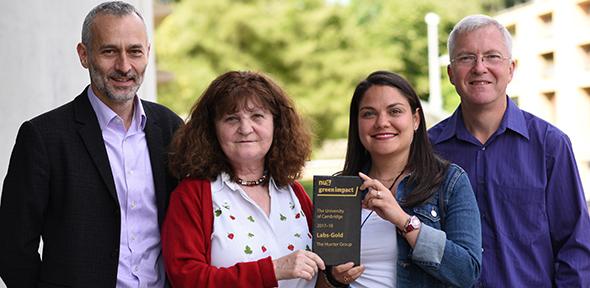
Staff who have just won a Gold award for their efforts to make a lab more sustainable are encouraging others here to follow suit.
Hunter Group lab manager Dr Giulia Iadevaia and her colleagues won a Gold award in the University’s Green Impact Awards last month. And they’d love to see other labs in the Chemistry department taking part in the Green Impact scheme, which encourages us to make our workplaces greener and more efficient.
"Some people think this might be difficult or take a lot of time. But the things we are doing - like holding monthly lab meetings, lab cleaning and safety audits to make sure that everything is safe and functioning and no waste is piling up - are easy to implement. And if more of us cut energy by closing fume hoods and switching off unused equipment and instruments, it could make the labs here much more sustainable," says Giulia.
The Hunter group has been focusing on cutting down the amount of wasted chemicals and wasted fridge space. To do that, they have adopted the ChemInventory software developed by Daniel Fitzpatrick, who created it as a postgrad here to keep better track of the Ley Group's chemicals. The software is now being used by more than 350 groups in 53 countries. [Daniel, now a postdoc in the Ley Group, was selected as one of C&EN’s 2016 'Talented 12' for his innovations. You can see more about this at: http://talented12.cenmag.org/daniel-fitzpatrick/]
Around 15 research groups here use ChemInventory to log their chemicals. A shared viewing system means that if a researcher in one group is seeking a particular chemical and does not have it in their own lab, they can check the database to see if another group has it. "This saves us from buying more chemicals than we need," says Giulia.
The Hunter group also puts a barcode and number on every chemical container and assigns it an exact location down to the cabinet, shelf or tray where it’s kept, so it’s very quick to find. "In the past, I have spent over an hour searching for a chemical in a cupboard, lifting out every container to see if it’s got the chemical I’m looking for," says Giulia’s colleague, Dr Ana Belenguer. "This system is very simple and easy to use.
"And this kind of efficient management helps sustainability," adds Giulia. "It cuts down on the waste of chemicals and also helps us with our stock checks and safety audits."
In their quest for efficient management, the Hunter Group also implements a system of nominated caretakers for instruments. The caretakers ensure that every new starter receives the right training in its use, and help with the instruments' maintenance. "This saves the lab time and money," says Giulia. They also take care to make the actions and rules laid out in the Laboratory Management and Safety Plan clear to every new starter in the Group.
Scientific research is one of the most energy- and resource-intensive aspects of the University, so it’s important for labs and research facilities to be operated in an efficient and sustainable way. The University’s Green Impact accreditation scheme recognises the efforts of staff who improve the environmental performance of their workplace.
Giulia and Ana would like to encourage other labs to take part in the scheme and improve their sustainability practices. "We think that the Chemistry department could be a lot greener," says Giulia. "We’d be happy to talk to other researchers and swap and share ideas about ways of managing labs more efficiently."
- For more information, contact Giulia by email: gi229@cam.ac.uk
